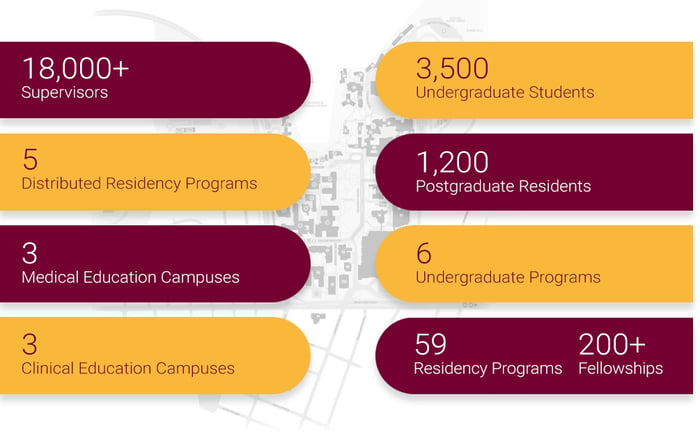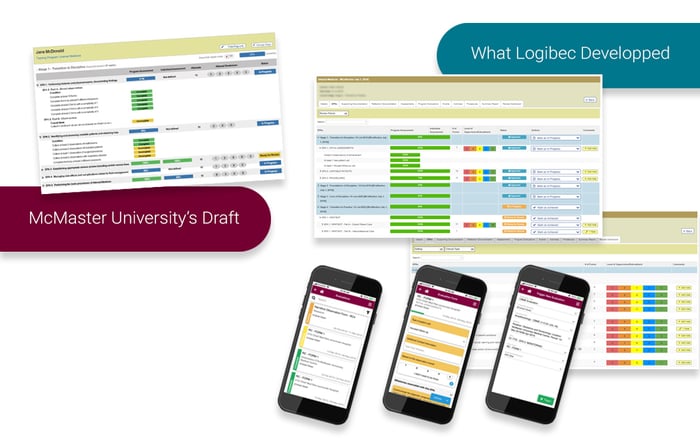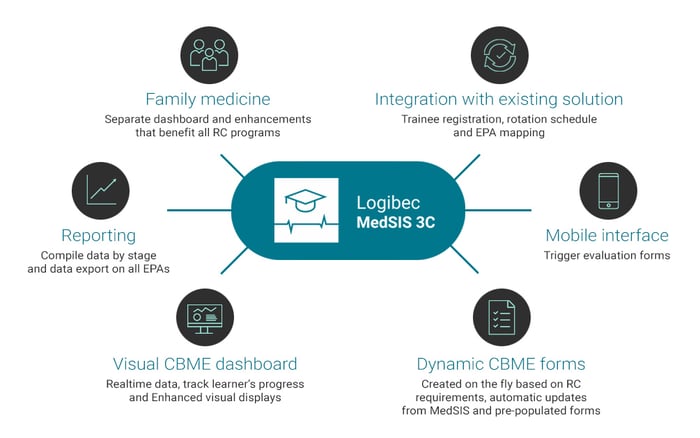2023 ICAM Conference: Competency-Based Education (McMaster University)

The annual International Congress on Academic Medicine (ICAM) is a prestigious event that brings together healthcare professionals, educators, and researchers from all over the world. During the 2023 edition, McMaster University and Logibec presented a workshop that highlighted the power of partnership in developing a platform that is intuitive, mobile, and efficient for competency-based medical education (CBME).
Explored below is a recap of the workshop, and how McMaster's story resulted in a win-win situation for learners, program directors, faculty, and Logibec - a true success story
The Speakers
- Zuzana Romano, Business Analyst, McMaster University
- Lisa Persaud, Business Analyst, McMaster University
- Melissa Bauce, Business Analyst, McMaster University
- Lucky Bhatti, Sales Director, Logibec
Developing a Pilot
As you may know, the rollout of the CBME program, announced by the Royal College of Physicians and Surgeons of Canada (RCPSC) in 2017, challenged Canada’s 17 medical universities to complete the rollout across all programs by 2022.
McMaster University has over 1,200 postgraduate residents and fellows in 59 different residency programs across a large geographic area. With such a major curriculum change and the need to manage it across all residency programs, it became clear that a powerful solution was needed.

The team at Logibec recognized early on that the success of the project would depend not only on training learners, but also supervisors, training program directors, competence committee members, and chairs. Thus, a pilot program was designed to bring CBME programs onto a single platform, where all users would be trained.
High-Level Rollout of the Pilot Program
- Meet with the program and set up their CBME Curriculum
- Train all users, learners, and faculty members. Provide training materials, including training videos
- Monitor and watch the evaluation numbers grow
- Regroup, refresh, and be ready for a go-live
The training process took three to five months, and the results were worth it. The pilot was a huge success, with tremendous feedback from all parties involved. In fact, this specific pilot idea was so successful that McMaster University is still using it to this date with new programs that are being onboarded.
Designing a New Module for CBME
One of the strengths of the pilot is that it enabled the development of an intuitive design, which was strongly inspired by the suggestions from McMaster University. Learners now find the platform easy to use and navigate, making it an ideal tool for busy healthcare professionals and administrators. The solution is equally available on mobile, which means that learners can access the system from anywhere, at any time.
So, What Features Were Developed?
The new module was designed to streamline the CBME process, making it easier for everyone involved. Teachers can produce effectiveness scores after each rotation, and these scores are collected and sent to Logibec MedSIS 3C for accreditation purposes. The Postgraduate Medical Education (PGME) office at McMaster University also has access to run the Continuous Quality Improvement (CQI) for low-scoring rotations and other reports.
Features developed include a dashboard that gives a visual overview of the learner's progress with instant updates, mobile evaluation forms and follow-ups, integration with other systems, reporting, and dynamic CBME forms that are populated as the trainees/supervisors select the EPA on their mobile device.
The Impacts on Medical Education
The partnership has enabled McMaster University to use a platform that provides learners with the support they need to develop practical skills and knowledge in a structured and efficient manner. This also reduces the administrative burden of faculty and program directors.
Learners
- View stages and EPAs at any time using a graphic interface
- Spotlight EPAs that needed to progress
- Progress at own rate and timeline
- Easy trigger of assessment forms using their mobile device
Program Directors
- One-stop shopping that provides the programs with complete learner information
- Monitor learner's progress in individual stages/EPAs
- Use the system to track the overall progress of the learner
- Frequent feedback at every stage for earlier assistance for learners who are struggling
Faculty
- Forms are generated quickly and efficiently using a mobile device
- Learners can pre-fill the forms with all needed information on the EPAs, leaving faculty to add rating and comments
Transforming Medical Education Through Collaborative Partnerships
McMaster University and Logibec's collaboration is a shining example of how partnership and technology can transform medical education. Together, the two experts in their respective fields designed a solution that delivers dynamic processes, flexibility, and visual aspects to a complex curriculum.
The solution has helped other institutions like the University of Toronto and Université de Montréal to ensure the quality of education provided by the faculty remains high, while also providing valuable data that can be used for accreditation purposes.
Learn More by Downloading our Webinar
Do you play a role in implementing and improving competency-based medical education programs? We encourage you to download our recorded webinar, Mitigating the Challenges of CBME: The Need for the Right Platform, to learn how you can leverage technology to drive positive change in medical education.








-2.jpg?width=450&name=LGI1335-Corporate---Homepage-Carousel-Images-(Education)-2.jpg)